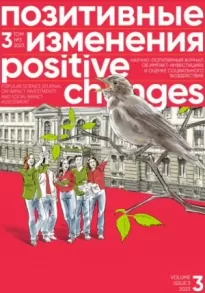Позитивные изменения. Том 3, № 3 (2023). Positive changes. Volume 3, Issue 3 (2023)

- Автор: Редакция журнала «Позитивные изменения»
- Жанр: Научная литература / Газеты и журналы
- Дата выхода: 2023
Читать книгу "Позитивные изменения. Том 3, № 3 (2023). Positive changes. Volume 3, Issue 3 (2023)"
MODEL 6: “CROSS-SECTORAL INTERNATIONAL PARTNERSHIP”
This model entails collaboration among academic institutions, government bodies, NGOs, businesses, and non-governmental organizations at the international level.
Acting as catalysts in fostering social innovation, universities bring together various sectors of the society to address social issues such as poverty and inequality, as well as environmental challenges. These cross-sectoral international partnerships create a platform for joint action, knowledge and resource sharing, and the development and implementation of novel ideas and approaches.
In summary, the “Cross-sectoral International Partnership” model enables universities, government bodies, NGOs, businesses, and non-governmental organizations to collaborate in creating and implementing social innovations aimed at enhancing the overall quality of life in society.
A good illustration of such collaboration, involving not just academic institutions but also NGOs and businesses from multiple countries, is the SIKE project — Social Innovation through Knowledge Exchange.[152] The project brings together 11 European partners, comprising five higher education institutions, five small and medium enterprises, and one NGO from the UK, Portugal, Spain, Germany, and Croatia. Funding for the project is provided through the Erasmus+ project and the European Council (SIKE, 2019).
Social innovators often have visionary ideas and a profound understanding of local contexts but may lack expertise in areas such as business development, marketing, reliable studies of human resources, design processes, and more. They may also face barriers in accessing prototyping tools or respective professional networks they could partner with in developing and implementing their ideas. The project offers a comprehensive needs analysis and monitors flagship case studies throughout its implementation, providing pertinent knowledge and skills. It supports the “innovators’ journey through the realm of social innovation” with an intensive program of training, workshops, and the provision of proven online tools that can be applied to support social innovations at various stages of the creation process. Although regional cases exhibit significant variations in tasks, technologies, and approaches, SIKE units can operate in various forms to cater to specific needs and local conditions. Some universities may cover multiple areas in their operations, while others may focus exclusively on a single aspect of social innovation development.
From the descriptions of these models, it is evident that they are selected based on the criteria of networking and partnership. Additionally, the principle of hierarchy is observed, ranging from simpler forms that involve only local communities and organized student interactions with local NGOs for volunteering, to more complex cross-sectoral international partnerships, which involve representatives from different countries and sectors, including business, NGOs, and the academic community. An exception to this rule is the inclusion of private international partnership initiatives such as Glasgow Caledonian University’s Common Good First project.
By analyzing these practices, we have identified six key characteristics of social innovation development models in universities.





